Are you a big time gaming lover? Do you really enjoy playing all different types of video games? Definitely you do! What is the hurdle for most of us when it comes to building your own PC? You possibly have no understanding of how the parts go together. You may also be wondering what parts you need for a gaming PC. Do not panic because in this article I am going to share a few good things that will encourage you to build your own PC for gaming. If you are completely new to computer building then you may want to try something a little simpler just to help you get some practice. For example, you could build a NAS first, which is like a typical PC but less complicated. It centers around streaming videos and similar media, like a sort of homemade Netflix. You find out some of the information you need about NAS computers, such as the best NAS for Plex, by searching for instructions online.
The important components in terms of setting up a custom built PC are a processor, top end memory and plenty of it, and an incredibly strong graphics card. You will also want a solid motherboard to handle all these parts as well and at least one hard drive. These are the vital components, however, keep in mind you will also need a case and power supply.
To take one step back through the technical conversation – let us discuss the entire computer system in a totally different angle. The motherboard is similar to a nervous system. The Central processing unit is similar to the human brain. The ram is compared to the temporary memory and the hard disk is known as the permanent memory. The Graphics Card is like using a second brain to operate all your graphic components. The audio card is also similar to having an additional brain to accommodate your hearing. There’s also a vitally important component known as the BIOS which is essentially the ‘medieval’ brain of the PC. It regulates all the fundamental elements – it enables the device to inhale and pump blood.
Now that you have a better understanding about the computer system, let’s take a look at specifics. First of all, if you are worried about assembling or even buying parts, you can always contact your local computer store and have them assemble the custom built PC specially designed for gaming. This will add to the price a bit, but may ease some of your concerns.
When buying the components, I would recommend starting with the CPU and motherboard. I would highly recommend a middle to upper end CPU. I often will look in the $150-$300 range for a CPU and then spend another $50-$100 on the motherboard. The two main companies that make good CPU’s are Intel and AMD. Buying a medium to top-end CPU from these companies is a solid choice. Next, I would recommend getting at least 4GB of RAM. If you want to overclock, you may want to go for some performance ram. After picking out the RAM, you can start to look at video cards. I would recommend a card around or above the $200 range. Both NVidia and ATI make solid cards. Also, read a few reviews to see how other users like the card. The last core component you will need is a hard drive. If you can afford it, I would highly recommend using some type of SSD setup. For example, maybe a small 128 GB SSD for your OS, then a larger SATA drive for your programs. If you can go 100% SSD, you will see great performance from the hard drives.
Last, you will need a case and power supply. Since this is a gaming computer, you may want to opt for a case with a few extra fans. When it comes to the power supply, make sure you get one with enough juice to power your setup. Usually a 600 watt PSU is good enough. However, if you are going with a dual video card setup, you may need to go bigger depending on the cards.
Believe me, building a gaming PC is not as complicated as you might assume. You do not need to be an electrical expert to have a degree or professional qualification to build your own PC for gaming; you only need some information to take you step-by-step through the entire procedure.
I would recommend you to lookup the components you want, find the exact specifications that will do the job in a manner you wish, buy these components separately, and then build the computer on your own. By undertaking it this way you’ll not only spend less money, but you’ll also understand the way the computer performs and by doing this, when it comes to maintenance you’ll be able to repair or improve your personal computer yourself. You see there isn’t any better method to know about a computer system than by building one on your own.


